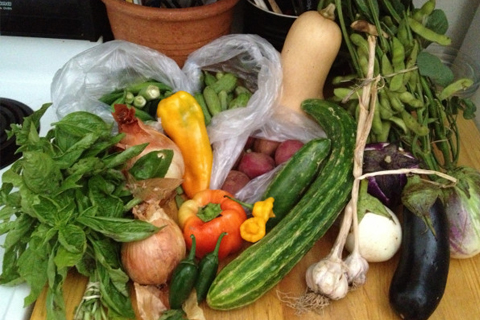An Anniversary Harvest from Tecolote Farm, Austin’s Original CSA

When you mention “CSA” in conversation, some people may laugh and recite a few lines from the quirky comedy “Portlandia”; others might launch into a discussion of the merits of organic vegetables. Perhaps your friend whips out a smartphone to share the latest social media post documenting her weekly allotment. Some might give a quizzical look and ask, “What’s a CSA?”
CSA stands for community sponsored agriculture, a commercial model in which people essentially buy into a local farm in return for a share of the crops produced. The concept has been around for about 25 years as a way to develop relationships between communities and the people who produce their food as well as promote healthier nutritional choices and encourage the consumption of local and seasonal vegetables.
Tecolote Farm is Austin’s—and Texas’s—oldest CSA. Located in Webberville, the farm was founded in 1994, two years after owners Katie and David Pitre moved here from Alaska. David, a native Texan with a degree in agroecology, wanted to return to the state after farming in both California and Alaska, and “Austin was a good fit—a progressive, university town,” Katie explained. Her husband loves to cook, and that passion inspired him to work with restaurants; the original concept was that the farm would supply organically grown vegetables to local eateries. They found a raw piece of land that had been used for cattle grazing and was home to a pair of great horned owls. “We’d go out there and, instead of flying away, those owls would swoop down over our heads,” Katie reminisced. They chose Tecolote (Spanish for “owl”) for the site’s name to “give honor to the Tex-Mex nature of where we’re farming.”
 The Pitres had expected to have the local restaurants clamoring over their fresh produce but, at the time, interest wasn’t widespread; they decided to start a CSA as a way to sell additional veggies. “The local organic food movement blossomed,” said Katie, and over the next 20 years, Tecolote Farm’s CSA program developed a ten-year wait list for members, came to employ ten full-time and five part-time employees, and has seen three Pitre children work on the farm (“We try not to enforce slave labor too much,” Katie laughed).
The Pitres had expected to have the local restaurants clamoring over their fresh produce but, at the time, interest wasn’t widespread; they decided to start a CSA as a way to sell additional veggies. “The local organic food movement blossomed,” said Katie, and over the next 20 years, Tecolote Farm’s CSA program developed a ten-year wait list for members, came to employ ten full-time and five part-time employees, and has seen three Pitre children work on the farm (“We try not to enforce slave labor too much,” Katie laughed).
Food trends, such as juicing and interest in organic veggies, have had a big impact on Tecolote Farm. Katie praised Boggy Creek Farm and Harrison Creek Farm, calling them “pioneers” for helping to lead the interest in organic standards, and she called out David Garrido (former executive chef at Jeffrey’s and owner of Garrido’s) as one of the early Austin chefs and restaurateurs who “got it.” Now, Tecolote Farm works with (among others) Vespaio, sells heritage-breed hog heads to Barley Swine, supports the innovative cooks of Dai Due (“We deliver to them, and they had one pot boiling acorns, mesquite seed pods, and sheep tongues, and it smelled great”), and helps the staff at Hopfields and Jack Allen’s Kitchen keep local fare on their tables. In addition to working with restaurants, they’re providing CSA boxes to some 500 families…and taking on new members for the first time in years. The boxes, which feed approximately three to five people, are packed into a reusable basket within 24 hours of delivery and can either be picked up at a hub or delivered directly to the door. Tecolote Farm is unique in that it adheres to a season for CSA service (March 18 through the first week in August); this allows them to focus on restaurant sales, expansion, and local farmers’ markets in the fall. Whether CSA or commercial kitchen generated, “all of the dollars stay here locally,” explained Katie.
Despite the growth, the Pitres still embrace a mom-and-pop ethic, aiming to keep quality high. “I’ve learned over 20 years,” Katie said, “that when you do something right, you don’t have to second guess yourself.” They like to keep a hand on all aspects of the business (“We don’t want to get so big that we lose quality”) and encourage a sense of community among their members through a variety of exclusive events. The Pitres also work to expand that community to those less fortunate through the grant received from the Austin Food & Wine Alliance, which allows them to share their CSA boxes with six to seven lower income families. In addition, Tecolote Farm represented Texas as a delegate at Slow Food International (a movement that emphasizes “good, clean, and fair” aspects of food production) and is working with the Fresh Chef Society, a local nonprofit that helps young adults who are transitioning out of foster care through acquiring skills and education in the culinary arts.
Whatever the specific aspect of their work, Katie said, “We are doing more of what we love best.” Sure, there are more projects in the works but Tecolote Farm will “stay as small as we need to be” to maintain that attention to detail and focus on supporting their community.






